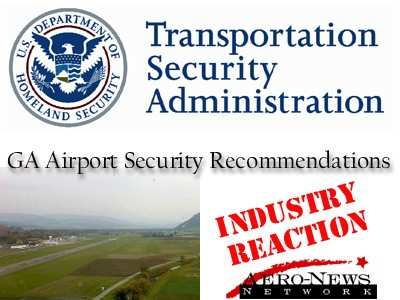Mon, May 24, 2004
AOPA Takes Wait-And-See Approach To New TSA GA Airport
Guidelines
The Transportation Security Administration has reaffirmed that
it does not consider general aviation aircraft and airports to be a
threat, in and of themselves. In its long-awaited guidelines for
enhancing security at general aviation airports, the agency said GA
airport managers have already undertaken voluntary security
measures both before and since the September 11 terrorist attacks.
The guidelines, which contain many of AOPA's suggestions, are
intended to offer a consistent set of best practices that offer a
level of security appropriate to each airport's situation.

"AOPA worked long and hard to make sure TSA made the guidelines
relevant to general aviation — that they didn't apply airline
airport security to GA," said AOPA President Phil Boyer. "Now that
the federal guidelines are out, it's crucial that decisions by
state and local authorities reflect the guidelines and are
appropriate to each GA airport's individual situation."
 The TSA guidelines state several
times that they are not regulatory. The suggestions contained in
the document are not mandated changes. The intent, the agency says,
is to provide uniform, federally backed guidelines that give
airport managers and sponsors a consistent way to evaluate their
security needs. "Both TSA and the GA community agree that a single
approach to security will not cover the spectrum of the nation's GA
airports," said TSA Acting Administrator Adm. David Stone.
The TSA guidelines state several
times that they are not regulatory. The suggestions contained in
the document are not mandated changes. The intent, the agency says,
is to provide uniform, federally backed guidelines that give
airport managers and sponsors a consistent way to evaluate their
security needs. "Both TSA and the GA community agree that a single
approach to security will not cover the spectrum of the nation's GA
airports," said TSA Acting Administrator Adm. David Stone.
AOPA is concerned about how the guidelines might be interpreted
and implemented locally. Specifically, there are two appendices
that assess security characteristics of airports and offer
suggestions for security enhancements. The IP itself notes,
"Airport owners and operators should rely on their experience and
intimate knowledge of their facility, applying those items that are
both reasonable and effective."
TSA plans to adapt and amend the guidelines based on input from
the general aviation community. The agency has established a
special e-mailbox for collecting feedback. The address is General.Aviation@dhs.gov.
"AOPA will watch closely to see how the guidelines are
implemented," said Boyer. "The very credibility of the TSA
guidelines is at stake."
More News
From 2023 (YouTube Edition): "Ain’t Your Daddy’s Super Cub”—Don Wade Co-owned by Don and Ron Wade—the former of Don’s Dream Machines, a storied >[...]
Pilot-Rated Passenger Reported That The Pilot Did Not Adequately “Round Out” The Landing Flare And The Airplane Bounced And Yawed To The Right Analysis: The pilot state>[...]
Dead Reckoning Dead reckoning, as applied to flying, is the navigation of an airplane solely by means of computations based on airspeed, course, heading, wind direction, and speed,>[...]
Aero Linx: Lake Amphibian Club This website is created and sponsored by the Lake Amphibian Club, to help spread the word about these wonderful, versatile amphibians that can land j>[...]
“I am deeply honored to be sworn in as NASA administrator. NASA’s mission is as imperative and urgent as ever — to push the boundaries of human exploration, ignit>[...]
 Classic Aero-TV: In Praise of Alabamas Patriot Aircraft USA
Classic Aero-TV: In Praise of Alabamas Patriot Aircraft USA NTSB Final Report: Cirrus Design Corp SR22
NTSB Final Report: Cirrus Design Corp SR22 ANN's Daily Aero-Term (12.21.25): Dead Reckoning
ANN's Daily Aero-Term (12.21.25): Dead Reckoning ANN's Daily Aero-Linx (12.21.25)
ANN's Daily Aero-Linx (12.21.25) Aero-News: Quote of the Day (12.21.25)
Aero-News: Quote of the Day (12.21.25)




